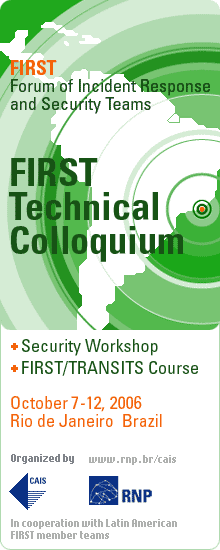Timezone
In October 2006 the local time in Rio de Janeiro is GMT-3.
For more detailed information, please visit:
http://www.timeanddate.com/worldclock/city.html?n=213
Weather
Remember that in the southern hemisphere seasons are the opposite to those in the northern hemisphere. In general, the summer is a nice time to visit the Corcovado mountain and the Christ The Redemeer statue on its peak, the Pão de Açucar (Sugar Loaf), the Santa Teresa cable car or even to spend a day on Copacabana and walk from the Atlantica Avenue to Ipanema. Wintertime is either recommended for visiting beaches, sun tanning and touristing, because temperatures drop just a few degrees.
The climate of Rio de Janeiro is hot almost all year round. The mean annual temperature is 27º C (80.6º F), and it rains with more frequency on spring and summer time (from September to November and from December to February, respectively). Usually activities are not hampered and people usually go out with an umbrella or a raincoat. Thus, visitors can enjoy walking around the city in any season. July is the coldest month, but temperatures rarely drop below 20º C (68º F).
On February, the most famous brazillian party happens, and the Carnival attracts people from all around the world. New Years is one of the largest in the world: more than 2 million people go to the sands of Copacabana beach to watch the fireworks show.
Currency, traveler checks, credit cards ad exchange rates
The currency in Brazil is the Real ( R$ ).
The official exchange rate is available from daily newspapers, hotel cashiers, banks and travel agencies. Cash and travellers checks are easily exchanged at these locations.
Almost everywhere (hotels, restaurants, night clubs, shops) accept Credit Cards. The exchange has been around R$ 2,20 to the US Dollar during this year, 2006. This makes the country an attractive destination not only for its natural beauty, but also now for its very accessible prices to foreign tourists.
- 1 EUR = 2,79 R$ (to facilitate calculation, 5 EUR approximately 14 R$)
- 1 USD = 2,20 R$ (to facilitate calculation, 5 USD approximately 11 R$)
You can cash traveler checks in banks or a Money Exchange Office (called ?Casa de Câmbio?).
Cash withdrawal machines (ATM), banks and exchange offices are available city-wide. Well-known credit cards (Visa, American Express, MasterCard and Diners Club) are accepted in hotels, most of the restaurants and shops.
You can exchange money in banks and money exchange offices. Banks may offer a more convenient exchange rate, although the procedure could take longer. Undoubtedly, the easiest foreign currency to exchange is the U.S. dollar (USD), thus, making it convenient to first exchange your money to dollars in your country. For information on exchange rates check:
For information on exchange rates check:
Eletricity
 Electric power in Rio de Janeiro is 110 volt, 60-cycle alternating current. Power outlets have 2 cylindrical holes or 2 flat holes with (or without) ground connection. It is convenient to bring an adaptor for these outlets to use your electric devices without problems. Some hotels may offer 220volt too, 60-cycle alternating current.
Electric power in Rio de Janeiro is 110 volt, 60-cycle alternating current. Power outlets have 2 cylindrical holes or 2 flat holes with (or without) ground connection. It is convenient to bring an adaptor for these outlets to use your electric devices without problems. Some hotels may offer 220volt too, 60-cycle alternating current.
Vaccination is neither obligatory nor necessary to visit Rio de Janeiro since the city is safe from the sanitary viewpoint. The public water supply is reliable. Public hospitals - available for tourists ? offer a 24-hour emergency service, without charge. The ambulance emergency service is also for free.
Business hours
- Bank Hours: Banks open at 10 am and close at 4 pm, from Monday to Fridays.
- Shop Hours: Shops are opened Monday through Fridays, from 8 am to 6 pm, and Saturdays from 8 am to 12:00 pm; however, shops located in important avenues are sometimes open on Saturday afternoon. Malls are usually open from 10 am to 10 pm, except on Sundays, when it close at 8 pm.
- Meals Hours: The hours in which ?cariocas? (from Rio de Janeiro) have their three meals are variable, since this is accommodated according to their activities.
Tour
Tourism in Brazil
Rio de Janeiro
Tips
10% of the amount of the check is usually left in cafeterias and restaurants when its not already included on bill. Doormen, porters, and ushers in cinemas and theatres are also generally tipped.
Most of the information presented on this page was based on the three following web pages:
They are strongly recommended for foreigners who will visit Rio de Janeiro and would like to obtain additional information about this country.

 Electric power in Rio de Janeiro is 110 volt, 60-cycle alternating current. Power outlets have 2 cylindrical holes or 2 flat holes with (or without) ground connection. It is convenient to bring an adaptor for these outlets to use your electric devices without problems. Some hotels may offer 220volt too, 60-cycle alternating current.
Electric power in Rio de Janeiro is 110 volt, 60-cycle alternating current. Power outlets have 2 cylindrical holes or 2 flat holes with (or without) ground connection. It is convenient to bring an adaptor for these outlets to use your electric devices without problems. Some hotels may offer 220volt too, 60-cycle alternating current.